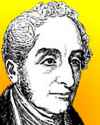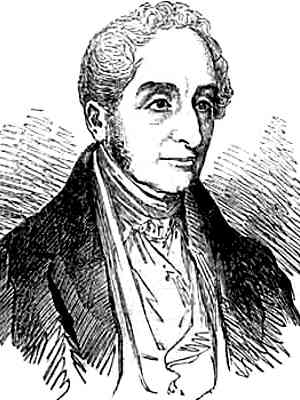 (source)
(source)
|
Henry Fourdrinier
(11 Feb 1766 - 3 Sep 1854)
English inventor of paper-making machinery known by his name, which is still at the core of modern continuous production equipment.
|
MR HENRY FOURDRINIER
Obituary from Gentleman's Magazine (1855)
Sept 3, 1854. Aged 88, Henry Fourdrinier, esq.
This gentleman was descended from an ancient family in one of the northern provinces of France, whence, by religious persecution, they were driven into Holland. He was born in Lombard-street, on 11th Feb. 1766, and succeeded his father as a paper-maker and wholesale stationer. In conjunction with his brother, he patented the invention of a paper-making machine, in perfecting which he expended a considerable fortune. It may suffice here to state that the paper-making is constructed so as to imitate, and in some respects to improve, the processes used in paper-making by hand; but its chief advantages are, that paper can be made of any size which can be practically required, and with a degree of rapidity which leaves the old method at an immeasurable distance. This invention was perfected at the patentee's paper mill at Two Waters, in Hertfordshire, situated at the union of the river Gade with Bulborne Brook, about the beginning of the present [19th] century. Between the years 1800 and 1807, Messrs. Fourdrinier expended 60,000 pounds on account of the machine; and from losses consequent on its completion, defending the patent, &c., they became bankrupt in 1810. IN 1814, on the Emperor of Russia's visit to England, he commissioned a person to purchase the right of using Mr. Fourdrinier;s machine at the Imperial paper works at Peterhoff. An agreement was consequently concluded for the use of two of his machines for ten years at 700 pounds a year; and Mr. Fourdrinier;s son went to Russia to superintend them. The workmen were paid by the Imperial Treasury, but Mr. Fourdrinier never received his stipulated reward. Meanwhile Mr. Fourdrinier and his brother again petitioned Parliament upon their patent, fully proved by evidence to be their property. On 25th April, 1839, some interesting details of this ingenious invention were elicited during a debate in the House of Commons, when the evidence of Mr. Brunel and Mr. Lawson of the Times proved the paper-making machine one of the most splendid discoveries of modern times. The increase to the revenue was stated to be 500,000 pounds a year; and the saving to the country effected by it 8,000,000 pounds. The patentee's claim was at length recognised; and, in May, 1840, 7,000 pounds was voted by Parliament to Messrs. Fourdrinier, as some compensation for their loss by the defective state of the law of patents.
In November last [1854] some influential members of the paper trade commenced a subscription to purchase annuities for Mr. Henry Fourdrinier and his two surviving daughters, both unmarried. Ere much progress was made Mr. Fourdrinier died, in his 89th year, at Mavesyn Rydware, in Staffordshire, where he had retired, in possession of his cheerful and benevolent spirit, and as contended in his humble cottage as he was formerly in his spacious house. His personal appearance is thus described by his daughter Harriet E. Fourdrinier, in a little work called "Our New Parish; its Privileges and Progress, 1851," dedicated to her beloved father as a tribute of veneration on the completion of his 86th year:—"His form is spare; his hair is white; he has passed that age of 'four score years' which the Psalmist so touchingly describes; but, at present, we rejoice to say, his strength is not 'labour and sorrow.' His walk is active; his eyes are bright; his health is good; his spirits buoyant, and his gait firm. He is the delight of his children and his 'children's children' the latter of whom, to the number of some twenty-four, make him their friend and companion. He will talk with the elder, or romp with the young ones; drive his daughters out in the carriage, or take long walks with the sons; run races with the boys, and dance with the girls; shews hospitality to his friends; does duty as a master; is loyal and devoted subject, and makes a capital churchwarden! Many worldly troubles still oppress him, but he bears the yoke as knowing by Whom it is laid on."
We hear the subscription is still in progress for the benefit of Mr. Henry Fourdrinier's daughters, to which we wish success.
Mr. Fourdrinier was the senior member of the Company of Stationers, having been elected a Liveryman 1787. His portrait is given in the Illustrated London News for Oct. 7, 1854, p. 345.
His younger brother, Mr. Charles Fourdrinier, was Master of the Company of Stationers in 1834, and died Feb. 7, 1841, aged 73.
- 11 Feb - short biography, births, deaths and events on date of Fourdrinier's birth.
- The Fourdrinier Paper-Making Machine - from Paper Manufacturing in the United States (1916).
- The Fourdrinier Paper-Making Machine - from Paper & Paper Making Ancient and Modern (1863).
- Fourdrinier Patent 2950 (1806) - A machine for cutting paper on a different principle from any hitherto used.
- Fourdrinier Patent 2951 (1806) - Method of making a machine for manufacturing paper of an indefinite length, laid and wove, with separated moulds.
- Fourdrinier Patent 3068 (1807) - Making paper by means of machinery.
- Henry Fourdrinier Biography - from Dictionary of National Biography (1889).
- 24 Jul - events for date of patent on Paper-Making Machine.





